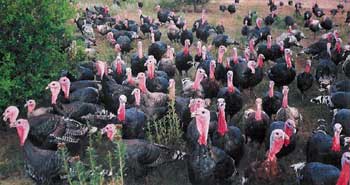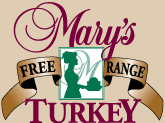|

WHAT TO BUY
Fresh, frozen, free-range, organic, kosher, or wild?
Keep it simple with these top three picks.
Best Bird
Fresh Heritage
Turkey
(up to $10 per pound)
Once teetering on the edge of extinction, these birds
are descendants of the first domesticated turkeys in
this country. "They have excellent genes," says Todd
Wickstrom (an
AFEA winner this year), who co-founded Heritage
Foods USA as a way of preserving and promoting heirloom
foods in
America.
He's emphatic in his belief that the conditions under
which a turkey is raised and processed are as important
as unquestionable pedigree. That's why heritage birds
are pasture-raised, antibiotic-free, and natural (no
additives). They're also allowed 26 to 28 weeks to
develop to their full weight, which is twice as long as
it takes factory-farmed birds to reach the same size.
This genetic preservation and careful raising ensures a
deeper, more intense flavor and a firmer texture, which
is why heritage turkeys trump the industrially raised
Broad breasted White, the bird most commonly found in
grocers' freezers. "Heritage turkeys are delicious,"
says Dave Zier, owner of Zier's Prime Meats and Poultry
in
Wilmette,
Illinois.
"They're like wild turkeys, but not gamy or dry."
During the past several years, small-farm producers as
well as independent distributors and butchers have
joined forces, making farm-fresh heritage birds
available to anyone with a car, phone, or computer.
Runner-Up
Crossbreed
Turkey
(about $3 per pound)
In second place is the crossbreed turkey, which is a
cross between a heritage turkey and the Broad breasted
White. This bird has the heft and enormous breast we're
accustomed to, but with a deeper, richer taste. When
buying one of these birds in the supermarket, Rick
Rodgers, cooking teacher and author of Thanksgiving
101, recommends comparing the size of the breast to
the size of the rest of the bird. "Larger-breasted
turkeys are new breeds that were created to produce a
larger amount of meat ― not a better flavor. The smaller
the ratio of breast meat to whole bird, the closer the
turkey is to the original model and the more
old-fashioned its flavor will be," he says. Most
purveyors of crossbreed turkeys adhere to healthy
raising practices, but look on the label to be sure.
The Bargain
Quality Supermarket Turkey (about $2 per pound)
The third pick is a Broad breasted White that has been
locally produced and minimally processed. "The key word
is local," says Rodgers. "The less a bird has to travel,
the fresher it's likely to be." When buying this type of
bird, let the label be your guide: You want a turkey
that was raised locally on all-natural, organic feed. As
with a crossbreed turkey, look for a bird with a smaller
breast-to-body ratio for a purer poultry flavor.
WHERE TO BUY
Heritage Foods
USA
On its Web site, Heritage Foods sells Bourbon Red and
American Bronze turkeys from small farms across the
country. (HeritageFoodsUSA.com)
Slow Food USA
To buy your heritage turkey directly from the source,
look to the Web site of Slow Food USA for a listing of
turkey farmers in your area.
(slowfoodusa.org/ark/turkeys.html)
Wild Oats Natural Marketplace
This natural-foods supermarket chain (with 78 stores in
24 states) sells heritage turkeys over the holidays.
(wildoats.com)
Diestel Family
Turkey
Ranch
The Diestel family's American Heirloom Collection
(organic broad breasted bronze turkeys) can be purchased
at markets in the West and
Midwest.
(diestelturkey.com)
Mary's
Turkeys
This purveyor's turkeys are available in
stores across the country. You can also pre-order them
online, in which case they will be shipped frozen.
(marysturkeys.com)
Whole Foods Market
A supermarket chain specializing in natural and organic
fare, Whole Foods sells fresh, natural turkeys from
local producers at Thanksgiving time. (wholefoods.com)
DON'T BUY
Basted or Self-Basting Turkeys
These birds have been injected ― before processing ―
with up to 3 percent of their weight (8 percent if
boneless) of a solution containing butter or other
edible fats, broth, water, spices, flavor enhancers, or
the vaguely described "other approved substances." Asks
Rodgers, "Why spend top dollar for a flavorful bird and
then impose false flavors on it?" Plus, the resulting
texture can often be mushy.
Wild Turkeys
An acquired taste, these birds are far gamier and drier
than the turkeys we're accustomed to eating.
Free
Turkeys
These are often the frozen birds that didn't get sold
last year, so they're not a worthy centerpiece for your
holiday meal.
STORING AND THAWING
♦ To store a fresh turkey: Keep it in the refrigerator
in its plastic wrapper until you're ready to cook it.
Tuck a rimmed baking sheet underneath to catch drips.
♦ To store a frozen turkey: Place it in the freezer
immediately upon arriving home.
♦ To thaw a frozen turkey: This calls for a bit of
planning. It takes 1 day of thawing time in the
refrigerator for every 4 or 5 pounds of turkey. So a
16-pound turkey would require 4 days to thaw completely.
There's also the water-bath method: Make sure the bird
is wrapped tightly before fully submerging it in cold
tap water, then allow 30 minutes per pound, changing the
water every 30 minutes. So a 16-pound turkey thawed this
way would be ready for the oven in only 8 hours.
TALKING TURKEY
What do those terms on the turkey label really mean?
Here's a glossary of the most common classifications.
free-range A turkey with access to the
outside. But don't be fooled ― just because it has
access doesn't mean a bird will take advantage of it.
fresh Technically, a turkey that's never
been kept below 26˚F. But Wickstrom finds this to be an
evasive definition: Most (Broad breasted White)
Thanksgiving birds are processed in September and
October but are still labeled fresh in November, which
means they've been kept just above 26 degrees for
months.
frozen A bird that's stored below 0˚F.
hard-chilled, or not previously frozen A
turkey that's been held between 26˚F and 0˚F.
hen/tom A hen is a female turkey, and a
tom is a male. Setting aside size, even Zier admits he'd
be hard-pressed to detect a difference in the taste of a
turkey based on its gender. Where the bird's gender does
matter, though, is in determining what size turkey you
should buy. With hens, which run in size from about 8 to
16 pounds, buy a pound of turkey per person. But for
toms, which start at 17 pounds, calculate about 3/4
pound per person, as there's a greater meat-to-bone
ratio.
kosher A bird that's been processed by
hand following kosher laws, all while under rabbinical
supervision. The turkey is soaked in water for half an
hour, then packed in kosher salt and placed on an
incline for about an hour to allow the blood to drain.
"A kosher bird is an acquired taste," says Rodgers. "It
can seem salty."
natural A bird that contains no artificial
ingredients or added color and is minimally processed.
This doesn't mean it hasn't been treated with
antibiotics.
organic
A turkey that has been certified by a USDA-accredited
agency. The term organic ensures that the bird was
raised on organic feed, was free-range, and wasn't
treated with any antibiotics.
pasture-raised A turkey reared in the
pasture full-time and allowed to forage for its own
food. "This can still be iffy," says Rodgers, "because
there's no USDA standard or certification for
pasture-raised meat."
―
David Leite, Bon Appetit,
November 2006
|







